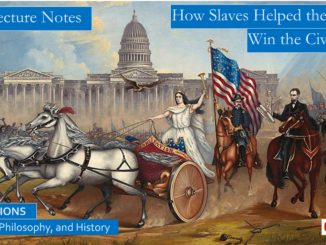
Stories of How Slaves Helped the Union Win the Civil War: Yale Lecture Notes
To win the war, Lincoln drafted the Emancipation Proclamation, shared it with his Cabinet, and then pocketed the document until the fortunes of war improved for the North. After the victory at the Battle of Antietam and Grant’s victory at Vicksburg, Lincoln released the Emancipation Proclamation as an executive order issued under his war powers as Commander-In-Chief in September 1862.
What the Emancipation Proclamation did not do was emancipate any slaves immediately, nor did it emancipate the slaves in the border states loyal to the Union cause. Lincoln proclaimed that if the Confederacy surrendered by January 1, 1863, she could keep her slaves, but if the rebellion persisted after that date all slaves in the rebelling states would be free.
David Blight in his lecture says:
There were at least four immediate and visible effects of the Emancipation Proclamation. First, every forward movement the Union armies now would, whether some of those officers liked it or not, liberate more slaves. Second, news of this Proclamation, whatever the details and the fine print, would spread like wildfire across the South, and it would attract towards Union lines more freed people. We have testimony of Confederate soldiers and white Southerners saying they first heard about the Emancipation Proclamation from their slaves. Third, it committed the United States Government in the eyes of the world to Emancipation. That’s terribly important when we remember that Great Britain was on the verge of recognizing the Confederacy as an independent nation. Fourth, Lincoln formally authorizes once and for all, although it’s already begun to happen, the recruitment of black men into the Union Armies and Navy, and it authorizes a formal process now to recruit black men to the Union uniform. And before the war will end about ten percent of all Union forces will be African American– approximately 180,000–eighty percent of whom were former slaves, from the slave states. […]
